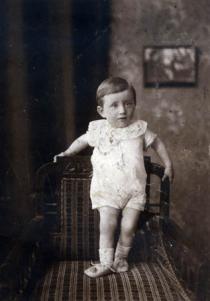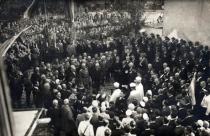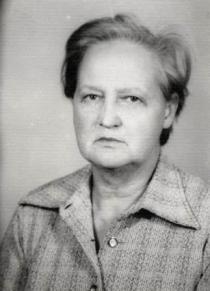Party of the Avoda bank's board of directors in Ruse
This is a party of the Avoda bank's board of directors in Ruse during the 1930s. On the narrow side of the table is my father Merkado Mois Natan, a member of the board - the man with the dark glasses.
My father was in the administration of General Zionists. He was a member of the board of directors of the Jewish bank 'Avoda' Bank. [There is no further information on it]. There were several accountants in it, several tradesmen and several industrialists. My parents had Zionist political views - they were not in the politics because the Jews were out of the political institutions then. We had not only Jews for neighbors - there were Bulgarians, too. We got on well with them, and with their kids. However, my parents made friends more easily with Jews. My father attended the Jewish Bet Am. After World War II he used to work with Bulgarians only.
My parents respected the Jewish traditions - they observed kosher, but not Sabbath - because we had to work. However, they did close the shops on Pesach, Rosh Hashanah, Yom Kippur and Sukkot. We would go to synagogue on every holiday. We had a pupils' synagogue on Sabbath - on Friday nights and Saturday mornings. [Organised attendance of Jewish pupils to services at the synagogue on Saturdays at Sabbath.] There was a small and a big hall in the synagogue. The synagogue services for pupils were held simultaneously in the small hall - the prayers were read by the pupils themselves so that they might learn them. We had a famous teacher - we used to call him uncle Bucco - Bucco Delarubisa. He was a teacher in the middle school, his two sisters were teachers, too, as well as his wife. He once was the teacher of my mother, too. We learned many things from him. He was our Math teacher, but we learned a lot more from him - many sayings, for example, which famous people were Jews, he also taught us about the Jewish life and traditions. It was he who took us to synagogue on Friday evenings and we made our 'pupils' synagogue' in the small hall of the synagogue. After I had my bar mitzvah I started taking part in the prayers - I used to read them. We observed the high Jewish holidays at home, too. We would lay the table for the respective holiday, kindle the candles and read a prayer. Just simple observing of the traditions, without putting much passion into it. We would always buy matzah for Pesach. Purim was marked in its own way - we were given money and sweets. At Chanukkah we used to kindle the chanukkiyah at home.
We didn't have a garden, but we had a big yard in one of the houses, shared between four other buildings and we played there. My mother was ill because she had two hard births (mine and my brother's). She had problems with her physical condition and so we used to hire a housemaid from the neighboring villages Dimitrovden and Gergyovden for the winters. [The villages are named after Bulgarian Orthodox holidays. Dimitrovden is St Dimitar's Day, while Gergyovden stands for St. George's Day.] The housemaid had a bed in the kitchen.
We had both religious and mundane books, but I don't remember their titles. My parents did read, and especially my father, because my mother didn't have the time for it. Dad used to read contemporary novels. I remember that when I was 12, he brought home the 'Brown Book' [Editor's note: Probably a reference to 'Brown Plague' in the sense of Nazism.] against Hitler and I understood from it that Hitlerism persecuted Jews and communists. It was an international issue, it read also about the Leipzig trial [Georgi Dimitrov], for the Kristallnacht ['The Night of Broken Glass': the pogrom against German Jews. On the nights of 9th and 10th November 1938, gangs of Nazi youth roamed through Jewish neighborhoods breaking windows of Jewish businesses and homes, burning synagogues and looting. In all 101 synagogues were destroyed and almost 7,500 Jewish businesses were destroyed. 26,000 Jews were arrested and sent to concentration camps, Jews were physically attacked and beaten and 91 died (Snyder, Louis L. Encyclopedia of the Third Reich. New York: Paragon House, 1989:201)].





























